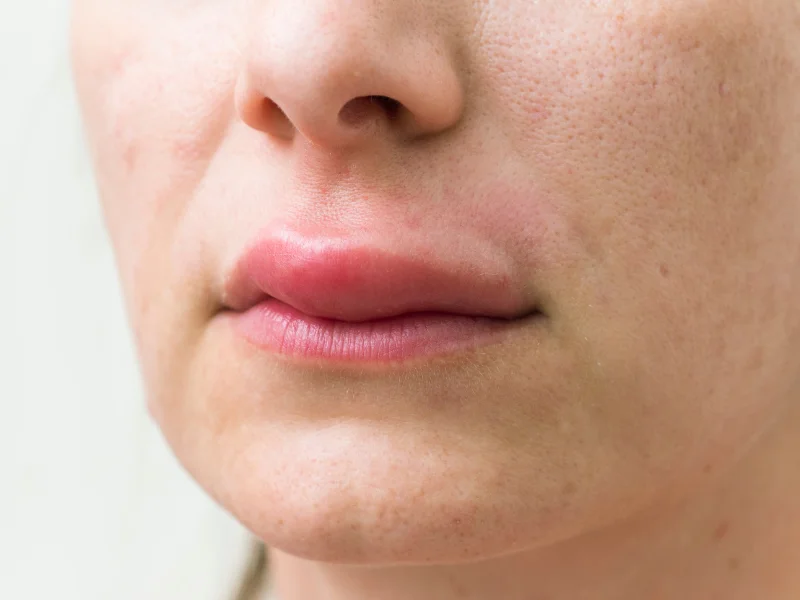Angioedema

Angioedema refers to the thickening of the deeper layers of the skin, causing a sensation of tightness, burning and discomfort; but does not itch. Common sites of angioedema include the face, around the eyes, lips, hands and feet. Importantly, it can affect the tongue, oral cavity and throat, causing hoarse voice, lump-in-throat sensation, and difficulty breathing. When it affects the gut, it can cause bloating and severe abdominal pain.
What causes angioedema?
Angioedema can accompany urticaria as manifestations of an allergic reaction. Allergies can be mild-to-moderate with skin-only manifestation, or severe circulatory collapse as in anaphylactic shock, or sudden constriction of the throat leading to suffocation and death.
Isolated angioedema can be an uncommon side-effect of medications such as Paracetamol, non-steroidal anti-inflammatory drugs (NSAIDs), and angiotensin converting enzyme (ACE) inhibitors.
Autoimmune diseases like Lupus and Sjӧgren disease can manifest with angioedema; while Scleroderma, Dermatomyositis, hypothyroidism and fluid retention in liver/kidney/heart failure can mimic angioedema.
In persons whose siblings or first-degree relatives experience recurrent episodes of swelling, difficulty breathing or tummy pain, hereditary angioedema (HAE) needs to be considered. Undiagnosed HAE can be potentially life-threatening, as episodes of swelling can lead to asphyxiation, or intestinal obstruction/perforation from intense swelling of the walls of the gastrointestinal tract.
What tests need to be done?
At the initial consultation, the allergist will ask about family history, analyse the circumstances surrounding the angioedema episodes, assess the severity, and look for possible triggers and risk factors contributing to it. A physical examination will differentiate angioedema from mimics, and look for clues to possible atopic and autoimmune conditions.
In drug allergy or drug-related angioedema, a diagnosis can often be made based on the drug history and physical examination. A challenge or provocation test is performed to ascertain suitability for alternate medications, such as the use of a cyclooxygenase (COX)-2 inhibitor for a person with NSAID-induced angioedema. Blood tests for key markers of complement activation, C1-esterase inhibitor, and autoantibodies can be performed if HAE or autoimmune disease is suspected.
How is angioedema managed?
In allergic angioedema, allergen avoidance is the cornerstone in management. In anaphylaxis, an action plan including an Epipen on constant standby is recommended. Avoidance of NSAIDs or ACE inhibitors is often all that is necessary in patient with suspected drug-related angiogedema. If patients have chronic recurrent angioedema, the use of regular antihistamines is often effective. For refractory cases, the use of immunomodulatory treatments may be employed. In HAE, C1-esterase inhibitor concentrate is indicated for both acute treatment and for prophylaxis, while bradykinin receptor blocker is approved for acute treatment.



